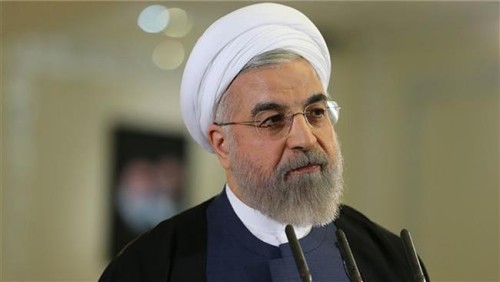PHOTO: Iranian President Hassan Rouhani
FRIDAY FEATURES
Analysis: Can “Trust” Ensure The Fulfillment of the Nuclear Deal?
Interview: “After Nuclear Deal, Anti-Americanism is at Dead End” — Analyst Zibakalam
UPDATE 1315 GMT: Two differing perspectives on the Tehran Friday Prayer’s commentary on the nuclear deal….
Fars News, the outlet of the Revolutionary Guards, headlines, “Senior Cleric: US Bowed to Iranian Nation’s Resistance in [Nuclear] Talks”.
The site quotes the Friday Prayers Leader, Ayatollah Movahedi Kermani, “The US grew disappointed after it saw the resistance of the Iranian nation against the economic sanctions and pressures, and Washington realized that it cannot make the Iranian nation withdraw; it also came to realize that it should respect the Iranians.”
The cleric continued, “The Zionist regime [Israel] and its supporters, specially the Saudi regime, are highly displeased with this agreement and we should tell them be angry at the Iranian nation and die of this anger.”
However, New York Times correspondent Thomas Erdbrink sees the positive in the cleric’s address:
At Iran Friday Prayers: the deal is great. "The Iranian nation received a great honor in political and economic areas," Friday prayer leader
— Thomas Erdbrink (@ThomasErdbrink) July 17, 2015
President Rouhani has called for the 5+1 Powers to adhere to the terms of Tuesday’s nuclear agreement as it is implemented, amid the Supreme Leader’s message that “close scrutiny” is needed because the US and its allies “are not trustworthy”.
Rouhani told British Prime Minister David Cameron by telephone on Thursday, “We are happy that we reached a win-win outcome in the negotiations. [But] it is necessary for all members of the P5+1 group to make effort for the implementation of the next steps of the agreement.”
On Wednesday, in a letter to Rouhani, Ayatollah Khamenei congratulated Iran’s negotiators but cautioned, “The prepared text needs careful scrutiny and must be directed into the defined legal process.” He said that Iran must “be concerned about possible violation of commitments by the other parties”.
Observers in Tehran have interpreted the message as the Supreme Leader’s continued wariness that the deal with the 5+1 (US, Britain, France, Germany, China, and Russia) will be completed, even after signature. Hamidreza Taraghi, an analyst considered close to the Supreme Leader’s circle, said, “Our leader is worried about several points in the deal.”
Tehran University professor Foad Izadi, one of several speakers at a press conference held by hardliners on Thursday, explained, “We are here to help the government. But it is clear there are serious problems with this agreement.”
Izadi claimed that “18 1/2” of the Supreme Leader’s 19 red lines in an agreement had been crossed.
The next step in Tuesday’s deal is a resolution by the UN Security Council confirming its terms and implementation. The next phase will be the linked 60-day period of review by the US Congress and Iran’s steps to meet the provisions limiting its uranium stock and nuclear facilities.
By December, the International Atomic Energy Agency hopes to verify that Iran is in compliance with all terms. At that point, the removal of UN, European Union, and US sanctions on Tehran can be completed.

